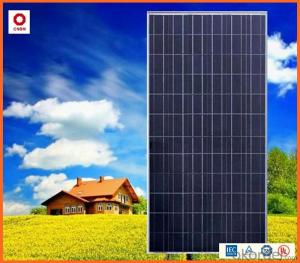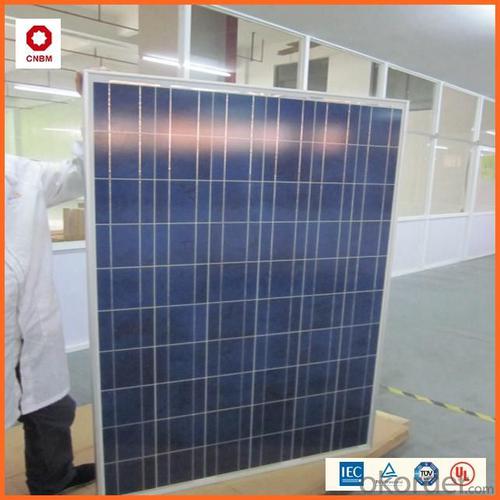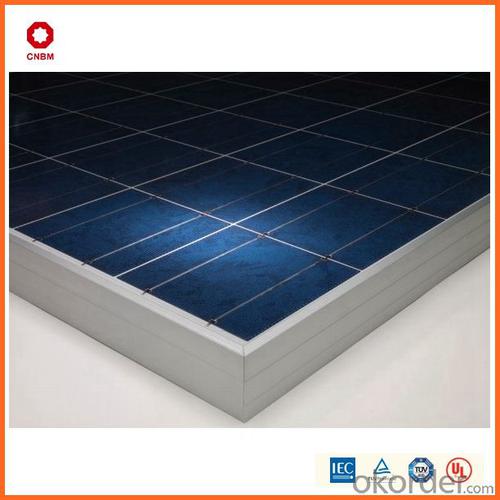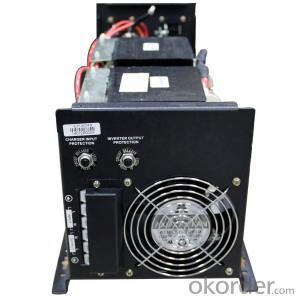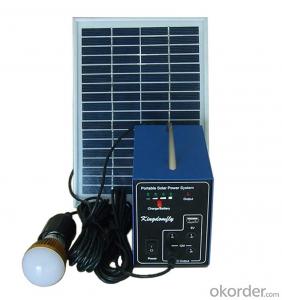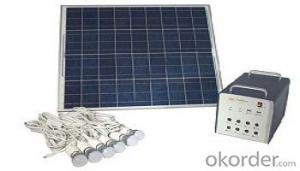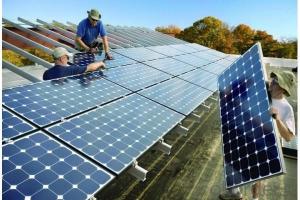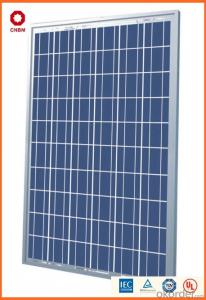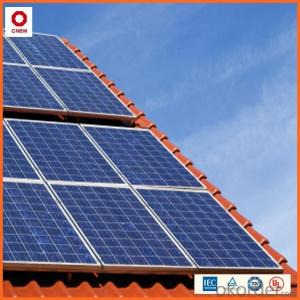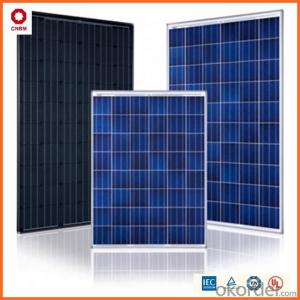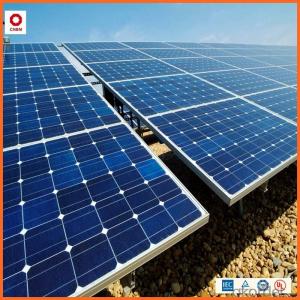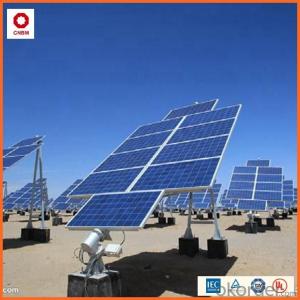Sirius Solar Energy Systems ☆☆☆Hot Sale 245W Poly Solar Panel On Stock 0.45/W!!!!☆☆☆ A Grade Good Quality
- Loading Port:
- China main port
- Payment Terms:
- TT OR LC
- Min Order Qty:
- 8000 watt
- Supply Capability:
- 10000000 watt/month
OKorder Service Pledge
OKorder Financial Service
You Might Also Like
Product Description:
Hot Sale !!! Quality and Safety of 245w-320w Poly Solar Panel
1. Rigorous quality control meets the highest international standards.
2. High-transmissivity low-iron tempered glass, strong aluminium frame.
3. Using UV-resistant silicon.
4. IS09001/14001/CE/TUV/UL
Warranties of 245w-320w Poly Solar Panel
1. 10 years limited product warranty
2. 15 years at 90% of the minimal rated power output
3. 25 years at 80% of the minimal rated power output
Technical date of 245w-320w Poly Solar Panel
ITEM NO.: | Mono 125*125 cell ,36pcs . Power range from 80Wp-100Wp | ||||||||
Maximum Power(W) | 80 | 85 | 90 | 95 | 100 | ||||
Optimum Power Voltage(Vmp) | 17.81 | 17.89 | 17.94 | 17.99 | 18.06 | ||||
Optimum Operatige Current(Imp) | 4.78 | 4.91 | 5.12 | 5.35 | 5.59 | ||||
Open Circuit Voltage(Voc) | 21.98 | 22.05 | 22.14 | 22.28 | 22.45 | ||||
Short Circuit Current(Isc) | 4.95 | 5.15 | 5.36 | 5.65 | 5.84 | ||||
Solar Cell: | 125*125 Mono | ||||||||
Number of Cell(pcs) | 4*9 | ||||||||
Brand Name of Solar Cells | JA Cell, Bluesun Cell | ||||||||
Size of Module(mm) | 1580*808*35 | ||||||||
Caple & Connector Type | Pass the TUV Certificate | ||||||||
Frame(Material Corners,etc.) | Aluminium-alloy | ||||||||
Backing (Brand Type) | TPT | ||||||||
Cell Efficiency for 100W(%) | 15.8% | ||||||||
Weight Per Piece(KG) | 12.0KG | ||||||||
FF (%) | 70-76% | ||||||||
Junction Box Type | Pass the TUV Certificate | ||||||||
Tolerance Wattage(e.g.+/-5%) | ±3%, or 0-3% | ||||||||
Front Glass Thikness(mm) | 3.2 | ||||||||
Temperature Coefficients of Isc(%) | +0.04 | ||||||||
Temperature Coefficients of Voc(%) | -0.38 | ||||||||
Temperature Coefficients of Pm(%) | -0.47 | ||||||||
Temperature Coefficients of Im(%) | +0.04 | ||||||||
Temperature Coefficients of Vm(%) | -0.38 | ||||||||
Temperature Range | -40°C to +85°C | ||||||||
Surface Maximum Load Capacity | 2400Pa | ||||||||
Allowable Hail Load | 23m/s ,7.53g | ||||||||
Bypass Diode Rating(A) | 12 | ||||||||
Warranty | 90% of 10 years,80% of 25 years. | ||||||||
Standard Test Conditions | AM1.5 1000W/ 25 +/-2°C | ||||||||
Packing | carton or pallet | ||||||||
1*20' | 25 Pallets / 450pcs | ||||||||
1*40'STD | 25 Pallets / 100pcs | ||||||||
Features of our products:
• High conversion efficiency mono/poly-crystalline amorphous silicon solar cells
• Modules incorporate high performance bypass diodes to minimize the power drop caused by shading
• High transmittance, low-iron tempered glass
• High performance EVA encapsulant to prevent destroying and water.
• AI frame: without screw, corner connection. 8 holes on the frame can be installed easily
• Good performance of preventing from atrocious weather such as wind and hails
• Certifications: CE IEC TUV VDE UL, Class I
• 10 years 90% power output warranty

Shipping of 245w-320w Poly Solar Panel
By Sea | Delivery from Shanghai or Ningbo seaport |
By Air | Departure from Shanghai Pudong Airport |
By Express | Post by DHL, EMS, UPS, TNT. |
- Q: What is the role of trackers in a solar energy system?
- The role of trackers in a solar energy system is to increase the efficiency and effectiveness of solar panels by following the movement of the sun throughout the day. This allows the panels to receive maximum sunlight exposure, optimizing the production of electricity.
- Q: Can solar energy systems be used in powering schools or educational institutions?
- Yes, solar energy systems can be used to power schools or educational institutions. Solar panels can be installed on rooftops or open areas to harness sunlight and convert it into electricity. This renewable energy source can help reduce electricity costs, promote sustainability, and provide a valuable educational opportunity for students to learn about clean energy. Additionally, solar energy systems can also serve as backup power during emergencies or power outages, ensuring uninterrupted learning and safety in educational institutions.
- Q: Can solar energy systems be used in areas with limited access to solar energy insurance coverage?
- Yes, solar energy systems can still be used in areas with limited access to solar energy insurance coverage. While insurance coverage may provide financial protection in case of damage or malfunction, it is not a requirement for the installation and operation of solar energy systems. However, it is advisable to thoroughly assess potential risks and consider alternative risk management strategies in the absence of proper insurance coverage.
- Q: Can solar energy systems be used for charging mobile devices?
- Yes, solar energy systems can be used for charging mobile devices. Solar panels convert sunlight into electricity, which can then be used to charge mobile devices through a charger or power bank. This renewable energy source is a sustainable and eco-friendly alternative for charging mobile devices, especially in areas with limited access to electricity grids.
- Q: Are there any maintenance costs associated with solar energy systems?
- Yes, there are some maintenance costs associated with solar energy systems. Although solar panels generally require minimal maintenance, occasional cleaning and inspection may be necessary to ensure optimal performance. Additionally, there might be costs involved in replacing any worn-out components or repairing any damages. However, these maintenance costs are typically much lower compared to the savings obtained from using solar energy in the long run.
- Q: How do solar energy systems impact the insurance coverage of a home?
- Solar energy systems can have both positive and negative impacts on the insurance coverage of a home. On the positive side, installing solar panels can increase the value of a home, which may result in higher replacement costs in the event of damage or loss. This can lead to higher insurance coverage limits to ensure adequate protection. Additionally, some insurance companies offer discounts or incentives for homeowners who install solar energy systems. These discounts can help offset the cost of insurance premiums and make it more affordable for homeowners to insure their homes. However, there are also potential negative impacts to consider. Solar panels can be vulnerable to damage from natural disasters such as storms, hail, or fire. Depending on the insurance policy, the coverage for such damages may vary. Some policies may include coverage for solar panels as part of the overall structure of the home, while others may require an additional endorsement or separate policy. Another consideration is liability coverage. If a solar energy system causes damage to neighboring properties or injures someone, homeowners may need to ensure they have adequate liability coverage to protect against potential lawsuits. It is important for homeowners to review their insurance policies and consult with their insurance providers before installing solar energy systems. This will ensure that they have the appropriate coverage in place and understand any potential changes or requirements that may affect their insurance premiums or coverage limits.
- Q: Can solar energy systems be used for powering electric vehicle public transportation systems?
- Yes, solar energy systems can definitely be used for powering electric vehicle public transportation systems. Solar energy is a clean, renewable and abundant source of power that can be harnessed to generate electricity for various applications, including charging electric vehicles. Solar panels can be installed on the rooftops of public transportation facilities, such as bus depots or charging stations, to generate electricity. This energy can then be used to charge the batteries of electric buses or other electric vehicles used in public transportation systems. The scalability of solar power systems makes them suitable for public transportation infrastructure. Depending on the size of the solar installation, it is possible to generate enough electricity to power an entire fleet of electric buses or other public transport vehicles. This reduces the reliance on fossil fuels and decreases greenhouse gas emissions, leading to a cleaner and more sustainable transportation system. Furthermore, solar energy systems can also be combined with energy storage technologies, such as batteries, to ensure a continuous power supply even during periods of low solar irradiation or at night. This allows for a reliable and uninterrupted charging infrastructure for electric vehicles. In addition to the environmental benefits, solar-powered electric public transportation systems can also lead to cost savings in the long run. While the initial investment for installing solar panels may be higher, the operational costs are significantly lower compared to traditional fossil fuel-based systems. Solar energy is free, and once the infrastructure is in place, the ongoing expenses are minimal. This can result in substantial savings for public transportation authorities over the lifetime of the system. Overall, solar energy systems are a viable and sustainable solution for powering electric vehicle public transportation systems. They offer environmental benefits, cost savings, and contribute to reducing dependence on fossil fuels. With the advancement of solar technology and decreasing costs, the integration of solar power in public transportation infrastructure is a promising avenue for a cleaner and greener future.
- Q: Can solar energy systems be installed on mobile homes or RVs?
- Yes, solar energy systems can be installed on mobile homes or RVs. With advancements in technology, portable solar panels and battery systems have become more compact and efficient, making it possible to harness solar energy for these mobile structures. This allows for greater energy independence and the ability to power various appliances and devices while on the move.
- Q: What is the average lifespan of a solar energy system?
- The average lifespan of a solar energy system is typically around 25 to 30 years.
- Q: Can solar energy systems be easily expanded or upgraded?
- Yes, solar energy systems can be easily expanded or upgraded. One of the major advantages of solar technology is its modular nature, allowing for scalability and flexibility. If you have additional space available, you can simply add more solar panels to increase the capacity of your system. Additionally, advancements in solar technology have made it easier to integrate new panels with existing systems. Upgrading a solar energy system can also be done by replacing older or less efficient components with newer and more efficient ones, such as upgrading to higher capacity inverters or adding battery storage for energy storage purposes. The expandability and upgradability of solar energy systems make them a cost-effective and sustainable choice for meeting increasing energy demands over time.
Send your message to us
Sirius Solar Energy Systems ☆☆☆Hot Sale 245W Poly Solar Panel On Stock 0.45/W!!!!☆☆☆ A Grade Good Quality
- Loading Port:
- China main port
- Payment Terms:
- TT OR LC
- Min Order Qty:
- 8000 watt
- Supply Capability:
- 10000000 watt/month
OKorder Service Pledge
OKorder Financial Service
Similar products
Hot products
Hot Searches
Related keywords


